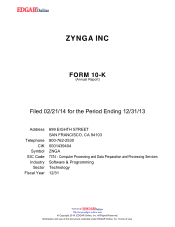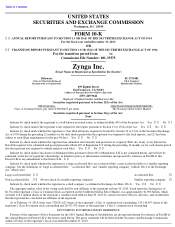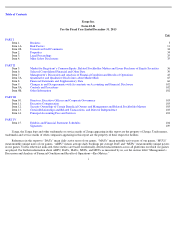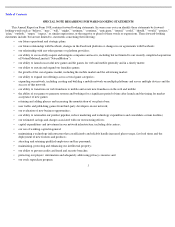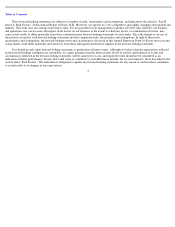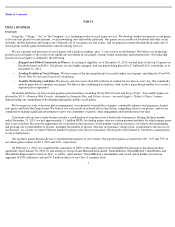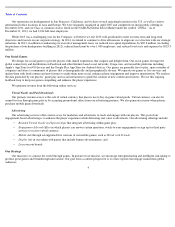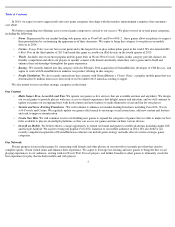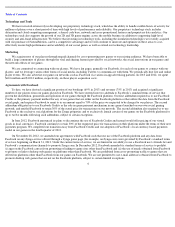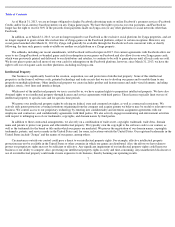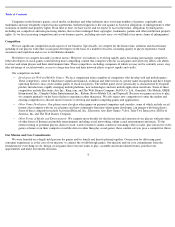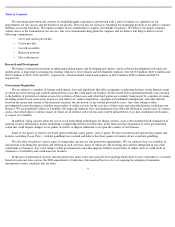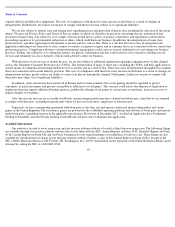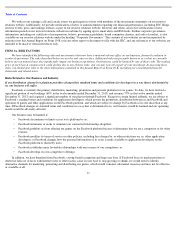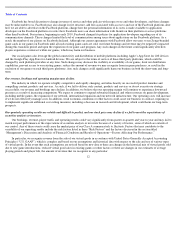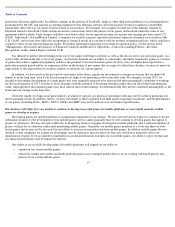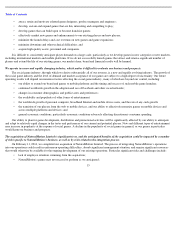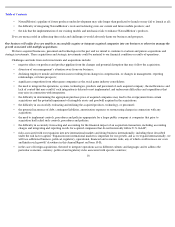Zynga 2013 Annual Report Download - page 11
Download and view the complete annual report
Please find page 11 of the 2013 Zynga annual report below. You can navigate through the pages in the report by either clicking on the pages listed below, or by using the keyword search tool below to find specific information within the annual report.
Table of Contents
As of March 31, 2013, we are no longer obligated to display Facebook advertising units or utilize Facebook’s payment services (Facebook
Credits and/or local-currency based payments) on any Zynga game pages. We have the right to process our own payments, and Facebook no
longer has the right to receive 30% of the proceeds from payments made on Zynga.com (or any other platforms or social networks other than
Facebook).
In addition, as of March 31, 2013, we are no longer required to use Facebook as the exclusive social platform for Zynga properties, and are
no longer required to grant certain title exclusivities of Zynga games on the Facebook platform, subject to certain exceptions. However, any
social game launched after March 31, 2013 by Zynga will generally be available through the Facebook web site concurrent with, or shortly
following, the time such game is made available on another social platform or a Zynga property.
The addenda, including our recent amendments, with Facebook will each expire in 2015. Our current agreements with Facebook allow our
users to use Zynga/Facebook co-branded game cards for redemption in our games on Facebook and also allow for our own Zynga game cards,
which were previously printed and delivered to our distributors and retailers, to continue to be sold to game players until all such cards are sold.
We do not plan to print and sell more of our own cards for redemption on the Facebook platform, however, since March 31, 2013, we have the
right to sell our own game cards on other platforms, including on Zynga.com.
Intellectual Property
Our business is significantly based on the creation, acquisition, use and protection of intellectual property. Some of this intellectual
property is in the form of software code, patented technology and trade secrets that we use to develop our games and to enable them to run
properly on multiple platforms. Other intellectual property we create includes product and feature names and audio-visual elements, including
graphics, music, story lines and interface design.
While most of the intellectual property we use is created by us, we have acquired rights to proprietary intellectual property. We have also
obtained rights to use intellectual property through licenses and service agreements with third parties. These licenses typically limit our use of
intellectual property to specific uses and for specific time periods.
We protect our intellectual property rights by relying on federal, state and common law rights, as well as contractual restrictions. We
actively seek patent protection covering inventions originating from the company and acquire patents we believe may be useful or relevant to our
business. We control access to our proprietary technology by entering into confidentiality and invention assignment agreements with our
employees and contractors, and confidentiality agreements with third parties. We also actively engage in monitoring and enforcement activities
with respect to infringing uses of our trademarks, copyrights, and domain names by third parties.
In addition to these contractual arrangements, we also rely on a combination of trade secret, copyright, trademark, trade dress, domain
name and patents to protect our games and other intellectual property. We typically own the copyright to the software code to our content, as
well as the trademark for the brand or title under which our games are marketed. We pursue the registration of our domain names, copyrights,
trademarks, patents, and service marks in the United States and, for some, in locations outside the United States. Our registered trademarks in the
United States include “Zynga” and the names of our games, among others.
Circumstances outside our control could pose a threat to our intellectual property rights. For example, effective intellectual property
protection may not be available in the United States or other countries in which our games are distributed. Also, the efforts we have taken to
protect our proprietary rights may not be sufficient or effective. Any significant impairment of our intellectual property rights could harm our
business or our ability to compete. Also, protecting our intellectual property rights is costly and time-
consuming. Any unauthorized disclosure or
use of our intellectual property could make it more expensive to do business, thereby harming our operating results.
7

